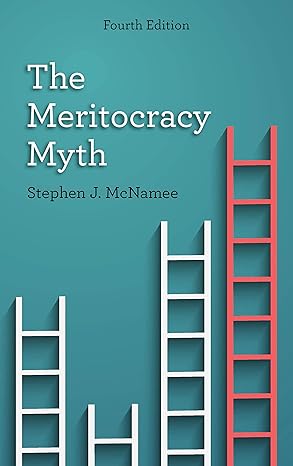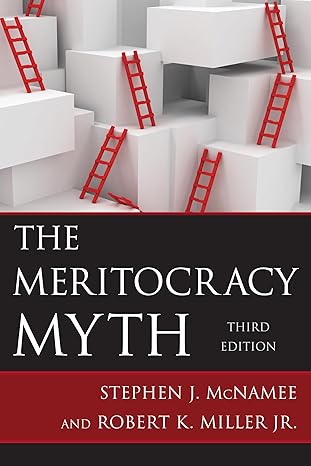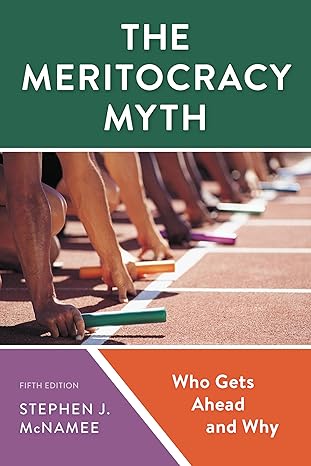
Stephen J. McNamee
Born:
Connection to Illinois: McName earned both his M.A. in Sociology and his Ph.D. in Sociology, University of Illinois at Urbana-Champaign. Biography: Stephen J. McNamee is professor emeritus of sociology at the University of North Carolina Wilmington.
Awards:
Web: https://people.uncw.edu/mcnamee/
WorldCat: http://www.worldcat.org/search?q=Stephen++J.++McNamee
Selected Titles
 |
The Meritocracy Myth: Fourth Edition ISBN: 1538103397 OCLC: 1025358228 Rowman & Littlefield Publishers 2018 The Meritocracy Myth challenges the widely held American belief in meritocracy—that people get out of the system what they put into it based on individual merit. The book examines talent, attitude, work ethic, and character as elements of merit and evaluates the effect of nonmerit factors such as family background, social connections, luck, market conditions, unequal educational opportunities, and discrimination. The fourth edition has been revised and streamlined throughout. It features new material on the current economic and political climate; the reasons behind the increasing levels of inequality in the United States and globally; how economic, social, and cultural factors shaped Donald Trump’s rise to political prominence, and more. The fourth edition includes a new chapter on marriage and mobility that examines how patterns in marriage tend to increase the concentration of wealth and pass on nonmerit advantages to children, furthering trends toward social inequality. A compelling book on an often-overlooked topic, The Meritocracy Myth is ideal for introducing students to this provocative topic while sparking discussion and reflection. |
 |
The Meritocracy Myth: Third Edition ISBN: 1442219815 OCLC: 833918164 Rowman & Littlefield Publishers 2013 The Meritocracy Myth challenges the widely held American belief in meritocracy—that people get out of the system what they put into it based on individual merit. The third edition has been revised and streamlined, with fresh examples and updated statistical information throughout. Chapters eight and nine have been combined into a comprehensive chapter about discrimination as a non-merit barrier to upward mobility. The book also features a new section on “The Great Recession.” The Meritocracy Myth examines talent, attitude, work ethic, and character as elements of merit, and evaluates the effect of non-merit factors such as social status, race, heritage, and wealth on meritocracy. A compelling book on an often-overlooked topic, The Meritocracy Myth has become a classroom classic to introduce students to this provocative topic. |
 |
The Meritocracy Myth: Who Gets Ahead and Why Fifth Edition ISBN: 1538173468 OCLC: 1382695028 Rowman & Littlefield Publishers 2023 There is a pervasive ideology that claims America is a land of unlimited opportunity, and people get out of the system what they put into it based on talent, attitude, hard work, and character. The Meritocracy Myth: Who Gets Ahead and Why deconstructs this idea by identifying factors that suppress, neutralize, or negate merit-based traits. These include economic inheritance, who you know (social capital) and “fitting in” (cultural capital), being at the right place at the right time, unequal access to educational opportunities, and discrimination based on race, sex, age, sexual orientation, physical disability, religion, and physical appearance. Discussion questions at the end of each chapter encourage students to think critically and develop a deeper understanding of why some people succeed and others fail. New to the Fifth Edition New discussion of national college admission scandal highlights how educational opportunities are mediated by social class (Chapter 5) Revised Chapter 7, “The Luck Factor,” includes discussions of how the COVID-19 pandemic, manufacturing of critical goods in the U.S., and the oversupply of college graduates impact the likelihood of intergenerational mobility New discussion on reparations as a way to address inequality for historically discriminated against groups reflects current debates (Chapter 10) New discussion of murders of Black suspects by police, Black Lives Matter, and the Dobbs Supreme Court decision illustrate ongoing patterns of discrimination that impact the prospects of Americans (Chapter 9) |




